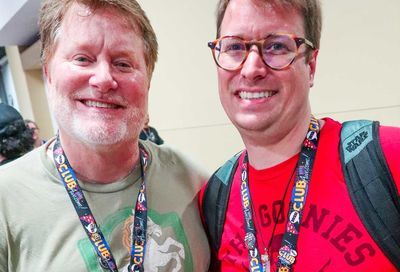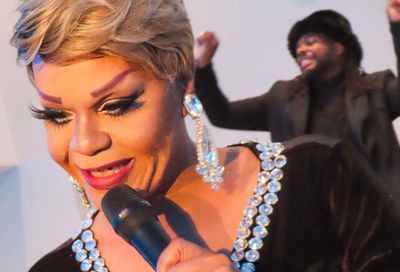Fag Bashing
Commentary: Alphabet Soup
The word lingered on my brain for about 30 seconds: fags. I mulled it for a second, was a little surprised to see it, and I moved on.
I didn’t think about deleting it.
It was part of a quote from Nikki Sixx of Mötley Crüe, talking about rock stars wearing make-up. It was in a story I was editing for dissemination on a news wire, and I didn’t even think about censoring it. An interviewer asked Sixx whether he wears more or less make-up on stage now than he did in his days as a hair metal rocker.
“It’s the same as I’ve worn always,” Sixx said. “Listen, if you wear makeup to look pretty like Poison, you’re a bunch of fags. Mötley Crüe wears it more like Keith Richards. It’s just to look [messed] up. I want to look like I just got punched in the face every day.”
The first time it crossed my mind that I should have at least thought about censoring the word was a couple of days later, when a colleague read the interview in the newspaper that originated it and expressed shock that they published a quote with the word fags in it. Apparently another word got edited, replaced by “[messed]” — but “fags” made it through.
It sank in slowly as my colleague expressed his dismay that I could have made a small edit to prevent the word from being broadcast out around the world when I shipped the story out to recipients of the news wire where I move content. But I hadn’t done anything of the sort.
I know an epithet about any other group would have caught my attention and made me contemplate its journalistic merit. But I have become inured to words like “fags” as long as they aren’t being hurtled hatefully toward me or someone I love, or being hoisted in the air on a protester’s “God hates” sign.
In fact, gay-related words like “fags” are part of my daily vocabulary, in a very in-group way. I don’t tend to use such strong language with people who are outside my close personal circle; if someone hears me say “fags,” they know exactly where it’s coming from and exactly what it means.
For instance, one dear adult gay male friend of mine went to high school with another close friend of mine. When the second friend got out pictures and showed me our mutual pal at age 15, I practically squealed with delight. “What a fag!!!!” I said. (Yes, four exclamation points.) Straight diva chicks who hang around with my gay male friends are “fag hags.” (No, not to their faces.) Cigarettes, when I’m in Britain, are fags too — but wait, that’s different.
I admit to being even looser with the word “gay,” using it in the manner most familiar to the adolescent set. I might say about something that seems stupid to me: “That is so gay!”
But even that is always said around people who know I am a self-affirming lesbian, and it’s always spoken with tongue firmly in cheek (and I don’t mean that in the gay sex way). I’m just saying it for effect, see. It’s offbeat and wacky and, for those who know me but don’t know me so well just yet, it’s unexpected and sardonic. Edgy, even.
To assure gender parity, I’ll stipulate that I do occasionally bandy the word “dyke” about, too. But the word “dyke” somehow doesn’t seem as spirited to me, maybe because it doesn’t flit out of the mouth like “fag” and “gay” do. Maybe “dyke” loses something when it’s coming out of my dykey mouth. I’ve known gay men to deliver it with aplomb, making me think, “Now why can’t I pull that off?”
The first time I heard another person use the word “dyke” about me, I was just out of college. I had come out, tentatively, to several friends but wasn’t completely out yet. My friends and I had somehow acquired a younger groupie who showed up at our Wednesday night drinking events, and she immediately came off as brash and annoying. After a few glasses of Busch Light ($3 pitchers!), she asked me when I’d come out.
I was fairly shocked; I knew I’d told enough people about my lesbianism to risk a security breach, but I didn’t expect to be confronted like that.
“How did you know?” I asked her.
“Come on,” she said. “Who are you kidding? You’re such a dyke.”
I was, of course, offended; who did this little straight girl think she was, calling me a dyke? I delivered the news to my friends that this girl was homophobic and she should be shunned and perhaps ostracized, but within a few weeks the little straight girl was coming out to all of us and apologizing to me for having been so obnoxious.
A few years later I’d find myself living in the D.C. area and walking down the street with my then-girlfriend and another couple. We were leaving a movie and hand-holding was occurring. We started getting hassled by a female panhandler who wanted change, and when we didn’t oblige, out came the “d-bomb,” in addition to other anti-woman comments. I suppose those were OK, given that she was in-group. But the word “dyke” being used like that frightened me, and I just wanted to get away from her as fast as I could.
So Nikki Sixx apparently is not in-group, but is he well-intentioned or is he being hateful? The appearance of the word in the originating newspaper prompted some gay journalists there to convene and publicize a roundtable about the issue.
“Is Poison a bunch of ‘fags?'” the roundtable flier asks. “That’s the question…raised last Friday with a quote from Mötley Crüe’s Nikki Sixx. The more interesting question, though, is: Has ‘fag’ lost its derogatory sting to the point where it’s now an acceptable newspaper word?”
Hindsight is 20/20. No, it’s not an acceptable word, whatever Nikki Sixx meant by it. With my 20/20 vision, I know that I should have thought about the use of that word, should have made a change in the story I sent out, and should have brought it up with the editors at the originating newspaper, who had given me the story a couple of days before it ran.
And I know that violence isn’t the answer, but if Nikki Sixx wants to look like he’s been punched in the face every single day, maybe using potentially explosive epithets is the way to get there without running up bills at the cosmetics counter.
Kristina Campbell writes Alphabet Soup biweekly — or thereabouts — and can be reached at kcampbell@metroweekly.com.
Support Metro Weekly’s Journalism
These are challenging times for news organizations. And yet it’s crucial we stay active and provide vital resources and information to both our local readers and the world. So won’t you please take a moment and consider supporting Metro Weekly with a membership? For as little as $5 a month, you can help ensure Metro Weekly magazine and MetroWeekly.com remain free, viable resources as we provide the best, most diverse, culturally-resonant LGBTQ coverage in both the D.C. region and around the world. Memberships come with exclusive perks and discounts, your own personal digital delivery of each week’s magazine (and an archive), access to our Member's Lounge when it launches this fall, and exclusive members-only items like Metro Weekly Membership Mugs and Tote Bags! Check out all our membership levels here and please join us today!






















